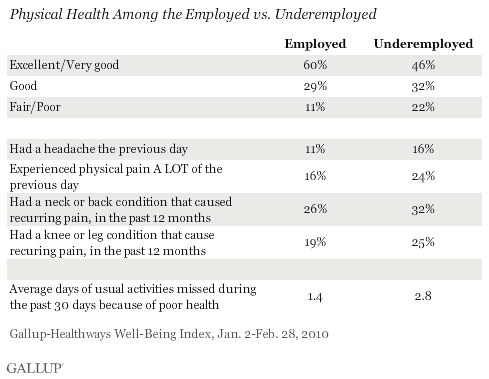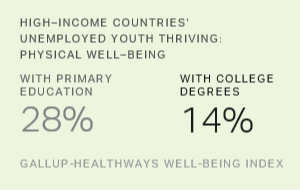WASHINGTON, D.C. -- ���۴�ýfinds underemployed Americans twice as likely as the fully employed to report that their health is fair or poor. Underemployed Americans are also more likely than their employed counterparts to report experiencing headaches and physical pain, and they miss twice as many days of usual activities.

Even when age is controlled for, differences in self-reported health persist. Across all age groups, underemployed Americans are more likely than the fully employed to report being in fair or poor health.
These results, based on ���۴�ýDaily tracking in January and February, include interviews with nearly 40,000 adults, aged 18 and older, in the U.S. workforce. ���۴�ýclassifies respondents as "employed" if they are employed full time or are employed part time and do not want to work full time. Respondents are considered "underemployed" if they are employed part time but want to work full time or are unemployed.
Implications
Physical conditions that can surface quickly, such as pain and sickness, are more common among the underemployed. It is uncertain at this point whether underemployment causes these conditions, or whether those experiencing conditions such as leg and back pain are more likely to become underemployed. Regardless, poorer relative health combined with and together create a situation where being underemployed appears to affect not just the wallet and the mind, but also the body.
Learn more about the .
Survey Methods
Results are based on telephone interviews with a random sample of 39,255 national adults, aged 18 and older, conducted Jan. 2-Feb. 28, 2010. For results based on the total sample of national adults, one can say with 95% confidence that the maximum margin of sampling error is ±1 percentage points.
Interviews are conducted with respondents on landline telephones (for respondents with a landline telephone) and cellular phones (for respondents who are cell-phone only).
In addition to sampling error, question wording and practical difficulties in conducting surveys can introduce error or bias into the findings of public opinion polls.
About the Gallup-Healthways Well-Being Index™
The Gallup-Healthways Well-Being Index measures the daily pulse of U.S. well-being and provides best-in-class solutions for a healthier world. To learn more, please visit .
